Mary Soderstrom's Blog, page 78
July 22, 2013
Detroit Is a Victimi of Sprawl Too: Krugman
The recent brouhaha about Detroit's financial problems and its filing for bankruptcy protection have sparked many comments. Paul Krugman in The New York Times, as usual, has some trnechant things to say, particularly about the dangers of comparing this situation with that of Greece.
But half-way through he touches on one of the greatest ironies of the story: the way that urban sprawl exacerbated an already difficult sitauiton:
"In Detroit’s case matters seem to have been made worse by political and social dysfunction. One consequence of this dysfunction has been a severe case of “job sprawl” within the metropolitan area, with jobs fleeing the urban core even when employment in greater Detroit was still rising, and even as other cities were seeing something of a city-center revival. Fewer than a quarter of the jobs on offer in the Detroit metropolitan area lie within 10 miles of the traditional central business district; in greater Pittsburgh, another former industrial giant whose glory days have passed, the corresponding figure is more than 50 percent. And the relative vitality of Pittsburgh’s core may explain why the former steel capital is showing signs of a renaissance, while Detroit just keeps sinking."
So the home of the 20th century autombile industry becomes, in part, a victim of the industry that made it once prosperous.
Below is the trailer for Michael Moore's movie Roger and Me. While it is about the Detoir suburb of Flint, it's also about what was and is wrong with the automobile-based society.
But half-way through he touches on one of the greatest ironies of the story: the way that urban sprawl exacerbated an already difficult sitauiton:
"In Detroit’s case matters seem to have been made worse by political and social dysfunction. One consequence of this dysfunction has been a severe case of “job sprawl” within the metropolitan area, with jobs fleeing the urban core even when employment in greater Detroit was still rising, and even as other cities were seeing something of a city-center revival. Fewer than a quarter of the jobs on offer in the Detroit metropolitan area lie within 10 miles of the traditional central business district; in greater Pittsburgh, another former industrial giant whose glory days have passed, the corresponding figure is more than 50 percent. And the relative vitality of Pittsburgh’s core may explain why the former steel capital is showing signs of a renaissance, while Detroit just keeps sinking."
So the home of the 20th century autombile industry becomes, in part, a victim of the industry that made it once prosperous.
Below is the trailer for Michael Moore's movie Roger and Me. While it is about the Detoir suburb of Flint, it's also about what was and is wrong with the automobile-based society.
Published on July 22, 2013 06:32
July 20, 2013
Saturday Photo: Gardening Where You Might Not Expect It
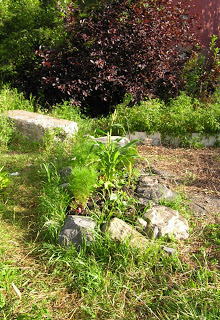 I've been delighted to follow the increasing number of people who seem to be finding corners of the city to garden in. These two photos were taken in les Champs de possible, a formerly abandoned maintenance yard owned by the city of Montreal.
I've been delighted to follow the increasing number of people who seem to be finding corners of the city to garden in. These two photos were taken in les Champs de possible, a formerly abandoned maintenance yard owned by the city of Montreal. The word "formerly" is used advisedly because while the city has recently agreed to let the field stay as it is, it has a stalwart group of admirers. Early I posted photos of the bees at work in it, and now here are two small garden plots that volunteers have begun.
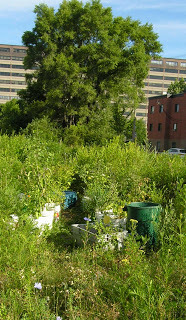
Published on July 20, 2013 14:29
July 19, 2013
Street Food: What's the Big Deal?
 Montreal has its first street food trucks this summer at various sites around the city There's been a lot of comment, most of it favourable, about the 27 trucks that move from location to location.
Montreal has its first street food trucks this summer at various sites around the city There's been a lot of comment, most of it favourable, about the 27 trucks that move from location to location. I, however, think they are an aberration. They make a lot of noise because they constantly must run a generator to keep their equipment working, they are NOT aesthetically pleasing, and they offer nothing like the refreshment afforded by sitting down in shade with even the simplest of snacks.
This morning when out walking I passed one filling its proprane tanks at a service station. Just around the corner a local terrace was opening up, offering coffee and croissants to eat sitting down beside a couple of flower boxes.
There's no question where I'd stop to grab a bit to eat.
When the novelty wears off, it will be interesting to see just how many trucks find steady business.
Published on July 19, 2013 10:45
July 18, 2013
Brilliant Idea: Car Shares
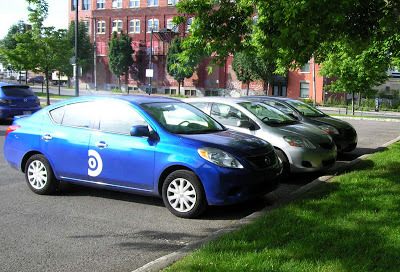 The sun was shining the other morning on the little troop of four Communauto cars parked not far from our house.
The sun was shining the other morning on the little troop of four Communauto cars parked not far from our house.Our car is approaching 12 years and even with only 42,000 kilometers, the thought occurs that we may have to replace it some day.
But not with another car of our own. Between a car-share membership like Montreal's Communauto and the occasional car rental, we'd be money ahead to go car-less, I think, particularly when getting a car to rent is as easy--and cheap--as it is.
Published on July 18, 2013 17:08
July 17, 2013
Lest We Forget Department: Today's the Anniversary of the First A-Bom Test
It wasn't that long ago, the Cold War is over, but, boy, have things not changed all that much. J. Robert Oppenheimer reflects on the whole project. "Now I have become death, the destroyer of world."
Published on July 17, 2013 07:58
July 16, 2013
Tools in Understanding the Past: Another Instance of mtDNA Analysis and Dogs
 As I've said, I'm working on a new non-fiction book, and the research is taking me in all directions. It'll be called
Road through Time
. A lot of the book will be focussed on roads that humans have taken. Their traces have had and are having an immense impact on the world we live in. My goal is to reveal some of these effeccts in the context of reflection about the future. The book will have some elements of memoir too, but that's a story for another day.
As I've said, I'm working on a new non-fiction book, and the research is taking me in all directions. It'll be called
Road through Time
. A lot of the book will be focussed on roads that humans have taken. Their traces have had and are having an immense impact on the world we live in. My goal is to reveal some of these effeccts in the context of reflection about the future. The book will have some elements of memoir too, but that's a story for another day. What I find myself deeply involved in at the moment is research into those paths humans have taken which now are almost invisible, that is to, say the first ones. It is generally agreed by scientists now that modern humans originated in Africa and that a relatively small group left between 50,000 and 80,000 years ago to, in effect, colonize the rest of the world.
 Tracking where they went involv
Tracking where they went involves some pretty sophisticated sleuthing, including analysis of our mitochondrial DNA (mtDNA.) What I didn't know until this morning is just how useful this technique can be for tracking the history of our constant companions on much of our journey, dogs.
New studies reported in The New York Times today indicate that wild dogs now found the Carolinas appear to be home-grown, that is, they do not have the European-derived mtDNA that nearly all other dogs have.
The study reawakens "the long debate about where and how dogs were domesticated. Current theory speculates that they are descended from wolves that somehow became attached to humans perhaps 12,000 to 33,000 years ago — an early amity that has an extensive pedigree in human folklore. (Think Romulus and Remus.)
"But where that may have happened is not entirely settled. Some say the earliest dogs emerged in the Middle East. Others point to an area south of the Yangtze River in China. ...(This) study provides more evidence for the China hypothesis and, as a result, lends support to the idea that the earliest domesticated dogs crossed the Ice Age land bridge known as Beringia some 12,000 years ago."
Amazing where looking closely can lead you!
Published on July 16, 2013 08:09
July 15, 2013
What to Do When You're Tired of Cleaning House...
Watch videos of tiny houses? This one's quite delightful.
Published on July 15, 2013 10:00
July 13, 2013
Saturday Photo: The Bees Are Back!
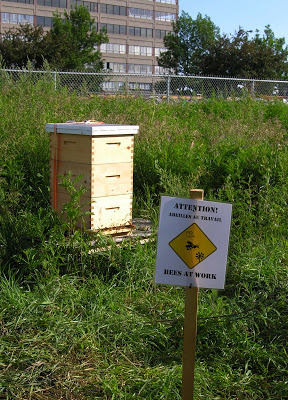 For the last several years there has been a beehive in the wild space belonging to the city of Montreal that has come to be known as Les Champs des possibles.
For the last several years there has been a beehive in the wild space belonging to the city of Montreal that has come to be known as Les Champs des possibles.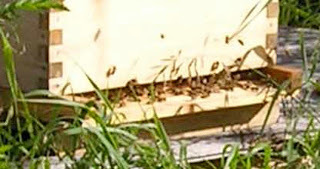 Last spring we were saddened to see that the hive had been dismanteled. Vandalism? Bee die-off? Too much work?
Last spring we were saddened to see that the hive had been dismanteled. Vandalism? Bee die-off? Too much work?I still don't know but this week I was delighted to see that a hive is back in place with a sign noting "Bees at Work," as indeed they were!
Published on July 13, 2013 14:14
July 12, 2013
The Queen: Why It Took Us So Long to Become Canadian..
Because you have to swear allegiance to the Queen in order to become Canadian, we dragged our feet for 17 years. In the end we decided that it was okay to vow to uphold her laws, but for a long time the idea of agreeing to become the subject of a monarch rankled.
So I'm very glad to see that three stalwart non-citizens are brining the matter to court. Michael McAteer,Simone Topey, and Dror Bar-Natan are taking up the torch left when Charles Roach died in 2005 after fighting for nearly 20 years to get the matter considered by Canadian courts.
The CBC quotes the trio:
" McAteer, 79, a retired journalist who immigrated almost 50 years ago, says his father was persecuted in Ireland for supporting Irish independence. "Taking an oath of allegiance to a hereditary monarch who lives abroad would violate my conscience, be a betrayal of my republican heritage, and impede my activities in support of ending the monarchy in Canada," McAteer says in his affidavit.
"Topey, who was born in Jamaica in 1966 and came to Canada in 1978, says swearing allegiance to the Queen — whom Rastafarians regard as the "head of Babylon" — would violate her deeply-held beliefs.
"Bar-Natan, 47, an Israeli math professor who came to Canada in 2002, maintains the Queen is a symbol of entrenched privilege and taking an oath to her would be "repulsive."
"It's not that I believe in total egalitarianism," Bar-Natan said in an interview.
"On the other hand, having royalty is a bit much."
It's about time, if you ask me.
So I'm very glad to see that three stalwart non-citizens are brining the matter to court. Michael McAteer,Simone Topey, and Dror Bar-Natan are taking up the torch left when Charles Roach died in 2005 after fighting for nearly 20 years to get the matter considered by Canadian courts.
The CBC quotes the trio:
" McAteer, 79, a retired journalist who immigrated almost 50 years ago, says his father was persecuted in Ireland for supporting Irish independence. "Taking an oath of allegiance to a hereditary monarch who lives abroad would violate my conscience, be a betrayal of my republican heritage, and impede my activities in support of ending the monarchy in Canada," McAteer says in his affidavit.
"Topey, who was born in Jamaica in 1966 and came to Canada in 1978, says swearing allegiance to the Queen — whom Rastafarians regard as the "head of Babylon" — would violate her deeply-held beliefs.
"Bar-Natan, 47, an Israeli math professor who came to Canada in 2002, maintains the Queen is a symbol of entrenched privilege and taking an oath to her would be "repulsive."
"It's not that I believe in total egalitarianism," Bar-Natan said in an interview.
"On the other hand, having royalty is a bit much."
It's about time, if you ask me.
Published on July 12, 2013 10:45
July 11, 2013
Gorgeous Day, Just LIke Our Ancient Ancestors Found It
The weather today is just about perfect here: high 26 C with low humidity and a little breeze. Makes you want to just enjoy things.
As it happens, I've been reading a lot about early humans and the way we evolved on the savannahs of East Africa. That set me to wondering about why this particular sort of weather feels so good. Is it because that's the temperatures we evolved to take advantage of?
Maybe: at least the highs for this week in Nairobi, Kenya, Arusha, Tanzania and Kampala, Uganda--all three cities very near the equator so there should be no winter-summer effect--are all in the mid-20s.
As it happens, I've been reading a lot about early humans and the way we evolved on the savannahs of East Africa. That set me to wondering about why this particular sort of weather feels so good. Is it because that's the temperatures we evolved to take advantage of?
Maybe: at least the highs for this week in Nairobi, Kenya, Arusha, Tanzania and Kampala, Uganda--all three cities very near the equator so there should be no winter-summer effect--are all in the mid-20s.
Published on July 11, 2013 14:18



